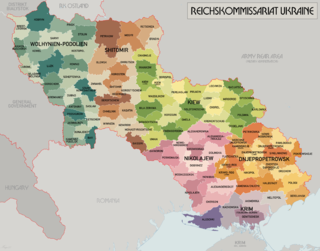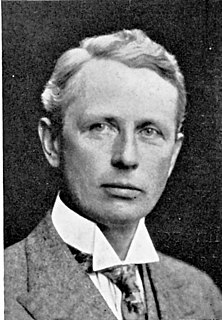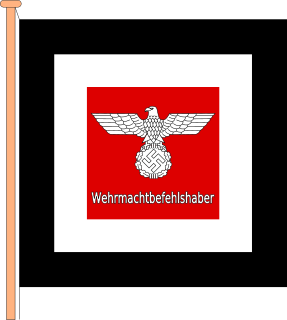Erling Sandberg was a Norwegian banker and politician.

Friedrich Wilhelm Rediess was the SS and Police Leader during the German occupation of Norway in the Second World War. He was also the commander of all SS troops stationed in occupied Norway, assuming command on 22 June 1940 until his death in 1945.

Reichskommissariat is the German designation for a type of administrative entity headed by a government official known as a Reichskommissar. Although many different such offices existed primarily throughout the Imperial German and Nazi periods in a number of different fields it is most commonly used to refer to the quasi-colonial administrative territorial entity established by Nazi Germany in several occupied countries during World War II. While officially located outside the German Reich in a legal sense, these entities were directly controlled by their supreme civil authorities, who ruled their assigned territories as German governors on behalf of and as direct representatives of Adolf Hitler.

The Reichskommissariat Norwegen was the civilian occupation regime set up by Nazi Germany in German-occupied Norway during World War II. Its full title in German was the Reichskommissariat für die besetzten norwegischen Gebiete. It was governed by Reichskommissar Josef Terboven until his deposition on 7 May 1945. The German military forces in Norway, then under the command of general Franz Böhme, surrendered to the Allies on 9 May and the legal government was restored.

Heinrich Fehlis was an SS officer during World War II, most noted for his command of the Sicherheitspolizei and Sicherheitsdienst in Norway during the occupation of Norway by Nazi Germany.

The Quisling regime or Quisling government are common names used to refer to the fascist collaborationist government led by Vidkun Quisling in German-occupied Norway during the Second World War. The official name of the regime from 1 February 1942 until its dissolution in May 1945 was Den nasjonale regjering. Actual executive power was retained by the Reichskommissariat Norwegen, headed by Josef Terboven.
The Army of Norway, also simply Army Norway, was a German army operating in the far north of Norway and Finland during World War II. The Army of Norway was under Armeeoberkommando Norwegen, abbreviated AOK Norwegen, which was one of the two army echelon headquarters controlling German troops in the far north.
The Administrative Council was a council established by the Supreme Court to govern Norway. The council of seven people was established on 15 April 1940, replacing Quisling's First Cabinet, and was led by Ingolf Elster Christensen. It was replaced on 25 September by another council by Josef Terboven, referred to in Norwegian as Josef Terboven's kommissariske statsråder.
Jens Bache-Wiig was a Norwegian engineer and industrialist.

Germany–Norway relations are foreign relations between Germany and Norway.

Wilhelm Frimann Koren Christie was a Norwegian jurist and Nazi collaborator. He is best known as director of the Norwegian Broadcasting Corporation for some time during the occupation of Norway by Nazi Germany.
Eyvind Mehle was a Norwegian radio personality, media professor and Nazi collaborator.
Roald Rachlew Dysthe was a Norwegian businessperson and acquitted Nazi collaborator.
Operation Blumenpflücken was a counter-resistance operation in occupied Norway, planned and carried out by the Gestapo/Sicherheitspolizei in 1944 and early 1945.
Fritt Folk was a Norwegian newspaper, published in Oslo. It was the official organ of the fascist party Nasjonal Samling, and came to prominence during the Second World War.
Events in the year 1908 in Germany.

The Reichskommissariat of Belgium and Northern France was a Nazi German civil administration (Zivilverwaltung) which governed most of occupied Belgium and northern parts of occupied France in the second half of 1944 during World War II.
Elise Otté was an Anglo-Danish linguist, scholar and historian. She completed a number of translations into English from different languages. She assisted her step-father in translating the Norse poems known as the Elder Edda.

The Wehrmachtbefehlshaber was the German chief military position, in countries occupied by the Wehrmacht which were headed by a civilian administration. The main objective was military security in the area, and command the defense in case of attack or invasion. The Wehrmachtbefehlshaber also had a judicial function, as he served as judge in German military courts. He had no control over Army units, but was responsible for defence, and housing for troops. In the occupied territories of the Soviet Union, the Wehrmachtsbefehlshaber was also responsible for securing the occupied territories, protect transport links and recording the crops.
Transportflotte Speer was a government owned waterways transportation company in Nazi Germany. At its creation it was tasked with the transportation of building material on the German inland waterways. During the war, it became subordinated to the Ministry of Armaments, and was given extensive coastal and inland transportation missions in occupied Europe, mainly in the service of Organisation Todt. The company was named after Albert Speer.








